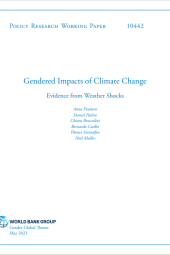Gendered Impacts of Climate Change: Evidence from Weather Shocks
Summary
This paper reviews the economic literature linking weather shocks (such as floods, droughts, and extreme temperatures, among others) and a large range of outcomes (from endowments to economic opportunities and agency). Men and women indeed have specific vulnerabilities and exposures. Specific physiological vulnerabilities are relatively minor: boys are more vulnerable to shocks in utero and girls and women to heat.
According to the paper, as policies are designed to address this challenge, there must be an understanding of how climate change affects different groups in society. There is growing evidence that climate change has a gendered impact, with women and girls disproportionately affected by extreme weather events and other climate-related phenomena. Understanding these impacts is essential to design policies that are effective, equitable, and sustainable.
Categories:
Research Paper, GEDSI
Publisher:
World Bank Group
Published Year:
2023
